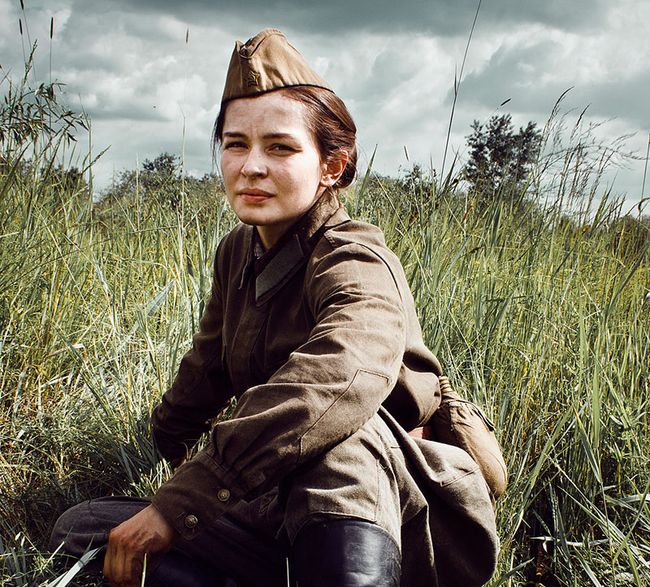Battle for history
Nezlamna (Battle for Sevastopol) goes on release in cinemas
There have been many reasons to wait for the release of the Ukrainian-Russian biopic by Serhii Mokrytsky. Apart from the fact that the film tells about Liudmyla Pavlichenko, one of the world’s famous Ukrainian women, and involves many Ukrainian actors (not the last role was played by brilliant actor Vitalii Linetsky), the unannounced war of Russia against Ukraine has added topicality and historical poignancy to the picture.
In the “far” 2012 year (so many events have taken place in the past 1.5 years that the time of Yanukovych’s presidency seem a far history to us), about three years ago, when the work on the project Battle for Sevastopol began, few people could predict that the history would soon take an abrupt turn and create new key points and meanings in the picture. Even the title in Ukrainian screening, Nezlamna (Unshakable), works against the Kremlin, because it is associated with uncompromising Nadia Savchenko, let alone the new for most of Ukrainians perception of history common with Russia. So, now the Ukrainian and Russian audiences, when they buy tickets for this biographical film, see different movies. Overwhelmed by the imperial euphoria, Russians who yell that the Crimea is theirs, without paying attention to the nationality of the leading character, will look in it for the historical proof of the political course taken by the new Kremlin tyrant aimed at bringing back the “original Russian lands.”As for the Ukrainians, the film may convince them of a different thing: not every piece of land, where birches grow and where Russians’ feet stepped (or even the land sprinkled with their “Orthodox” blood), should belong to the stranger. Because even in Sevastopol more Ukrainian, Tatar, Jewish (actually, all the nations in the former USSR could be listed) blood was shed.
So, I would ban the Russian title Battle for Sevastopol, if I were an adept of the “Russian World” in the RF. Because in the context of the story about Pavlichenko the Russian president looks at least as an ignoramus, when he asserts that the USSR would have won the war against Hitler without Ukrainians.
The famous Ukrainian sniper, about whom we should have shot a film long ago (without Russia), is one of the million examples of the great contribution to the victory made by our people. Taking into account the diplomatic efforts put by Pavlichenko for opening the Second Front, the contribution of the descendants of the famed Zaporozhian Cossacks to destruction of the Third Reich is priceless. I think that the American men were encouraged to take part in the World War II by the famous phrase of the Ukrainian woman who said at a press conference in Washington, “Gentlemen, I am only 25, but I have killed 309 Nazi occupants. Don’t you think, gentlemen, that it is enough of hiding behind my back?”
Actually, the scenes of the heroine’s stay in the US (Yulia Peresild in the leading role is the main lure of the picture in terms of actors’ lineup), where the brave girl becomes friends with Eleanor Roosevelt (Joan Blackham) are the most interesting, because they show the war of ideas and ideologies. However, the authors of the film haven’t used, unfortunately, all the possibilities, given by the American epopee of the heroine to deepen the content of the picture. The critics have already reproached the screenwriter of Battle for Sevastopol of week dialogs. We are making an assumption that one of the reasons of superficiality of the dialogs and subsequently the content of the picture is the irresoluteness of the director in his view on history. Mokrytsky has admitted in an interview that his heart is divided between Ukraine where he was born and grew up and Russia where he studied and is working. If Pavlichenko was as indecisive and divided in her estimation of the events as the director, she would not have become a legendary sniper.
Mokrytsky only touches the important topics of the Soviet history (above all, the price of the victory and the disregard of people), but he does not risk penetrating deeper to get to the truth either about the war, or the Communist regime. Therefore this pacifist film is an attempt to please everyone: the Ukrainian and Russian patriots, veterans and modern audiences, the East and the West, and in the end history. But history, which has always been by far the main combat field of the truth and lies, does not forgive compromises. And the destiny of Ukraine which has all the time been maneuvering among different peoples and states and helped in falsifying its own history is another proof that a high price must be paid for lying about history. Taking into account the tectonic improvements brought by Maidan into the mentality of Ukrainians, they won’t be satisfied by Mokrytsky’s film which for a Russian will seem to be bold criticism of the Soviet power because of the compromising effort to give half-truth for the truth. This is the reason why Battle for Sevastopol does not gather full houses, like it was with The Guide.
Of course, the war’s face is not a face of a woman. And the war does not become Ukraine, which have been a mother to her sons and daughters. But if the mother needs to be defended, the Ukrainians take weapons and show to the world the unconceivable examples of battle victories. They did so over 70 years ago in Sevastopol, Stalingrad, and Berlin, and they are doing this today in the Donbas. However, at the same time the words from the film soundtrack “Hug me” by the famous rock band Okean Elzy, “When the day comes, the war will be over,” remain topical.
Newspaper output №:
№25, (2015)Section
Culture





